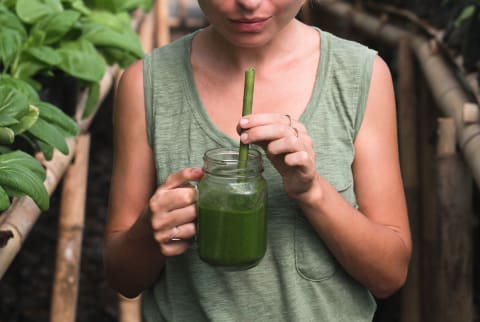Advertisement
How Ginger Helps Ease Anxiety & Creative Ways To Cook With It


Now more than ever, macronutrients (fats, carbs, and proteins) and micronutrients (minerals, vitamins, and phytochemicals) are topics of interest in neuropsychiatry, the branch of medicine that deals with mental disorders attributable to diseases of the nervous system.
The search for foods that balance brain chemistry and replenish neurotransmitters has produced the new interdisciplinary approach of nutritional neuroscience.
While many people find success with medications that manage their anxiety, I believe that using medication alone without addressing possible nutritional deficiencies is unlikely to lead to the long-term management of symptoms. If someone is taking medication while continuing to eat a poor diet, the underlying physical imbalances just get worse.
Why ginger is an anti-anxiety food
Ginger is a root vegetable that is well-recognized as a form of herbal medicine. It is a member of the same plant family as cardamom and turmeric.
Ginger has benefits beyond flavoring your favorite stir-fry recipe or easing an upset stomach. In fact, ginger is purported to have a variety of powerful therapeutic and preventive benefits. There is clear evidence of the effectiveness of ginger as an antioxidant, anti-inflammatory agent2. It also may be helpful for treating nausea. Ginger is known to decrease markers of age-related oxidative stress3, such as inflammation, swelling, and pain, and has been used for thousands of years for the treatment of hundreds of ailments like these.
Animal studies have indicated that it can raise serotonin levels4 and, therefore, may reduce anxiety.
With its delightfully tangy and invigorating scent and flavor, ginger is one of the most commonly consumed dietary condiments in the world. The resin from its rhizomes (roots) contains many bioactive components, which is why this pungent ingredient is believed to produce a variety of remarkable pharmacological and physiological effects.
Interest in ginger has increased significantly in recent years. From scientific studies, we now know that ginger exerts its anti-inflammatory power by suppressing the action of COX-2, the enzyme responsible for swelling and pain, and inhibiting the biosynthesis of the inflammatory mediators prostaglandin and leukotriene5.
According to several valid and reliable studies that date back to the 1990s, the anxiolytic (anti-anxiety) activity of ginger is very real6.
Ways of incorporating ginger in your anxiety-free kitchen:
- Cut it up and boil it to make ginger tea.
- Juice it and add it to smoothies.
- Put a few drops of ginger essential oil or ginger extract in your stir-fry near the end of cooking.
- Make the following Super Greens Juice.
Super Greens Juice
Ingredients:
- 1 cucumber
- 1 green apple or ¾ cup pineapple
- 3 celery stalks
- ½ cup kale
- ½ cup spinach
- 1 cup broccoli sprouts
- 1 handful of fresh parsley
- ½ lemon, peeled
- 1 thumb-sized piece of ginger
Method:
- Juice all the ingredients in your juicer and drink.
- If you want a sugar-free juice, make this recipe without the apple (or pineapple). This is something I do often.
Adapted from an excerpt of Anxiety-Free With Food: Natural, Science-Backed Strategies To Relieve Stress and Support Your Mental Health by Liana Werner-Gray with permission from the author.